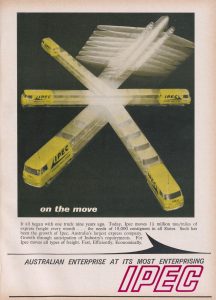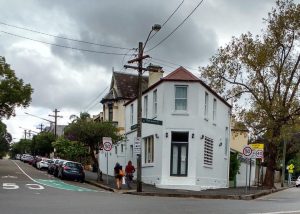by Lyn Collingwood, July 2022 (from Bulletin 5 of 2022, July)

Businessman, political activist and newspaper publisher Gordon Barton began his entrepreneurial career while still a student at Sydney University. He ran Ivory and Barton, a road haulage business, from his Wollstonecraft home before buying an Adelaide business, the Interstate Parcel Express Company (IPEC), and setting up an office at 1 Arundel St Forest Lodge. Here, any window-faced envelope was ‘round-filed’.
In the 1950s, parcel delivery was by post or rail. To protect government monopolies, freight carried by road was taxed. Barton bought an ex-US Army Mack truck on hire purchase, found a Yugoslav migrant driver handy with a spanner, and worked out a backblocks route to run onions and other produce from South Australia to Queensland without meeting any inspectors.
Also involved in the enterprise was future judge Jim Staples, then a fellow graduate finding legal work scarce. As an associate to Justice Edwards in the Supreme Court building, Barton brought his little English car into the city, solving any space problem by rolling the No Parking stand one length down St James Rd.
By the 1960s IPEC was Australia’s largest express transport company, with a fleet of several thousand trucks. Its yellow and black livery was everywhere: ‘If it’s urgent send it IPEC’.1
Barton used his wealth to fund various projects. He launched the Liberal Reform Group, opposed the Vietnam War and advocated an independent foreign policy, environmental conservation and the protection of human rights. The Liberal Reform Group became the Australia Party, a precursor to the Democrats.

In 1967 Barton formed Tjuringa Securities, a pioneer corporate raider that took over Federal Hotels (builder of the Hobart Casino, the first legal casino in Australia) and the asset-stripped Angus and Robertson bookshops and publishing business. Barton also founded two radical newspapers The Sunday Observer and Nation Review.
Barton was born in Java, the son of a Dutch schoolteacher mother and a Queensland father who managed a pearl schooner. At the outbreak of war, Barton moved to Sydney with his mother and older brother. From 1939 to 1946, he attended SCEGS (‘Shore’) where he was on the debating team. With First Class Honours in English and French in the Leaving Certificate, he was awarded an Exhibition Scholarship to study Law at Sydney University. A charismatic figure, well-spoken and well-dressed, with an interest in classical music, Barton studied the University Handbook closely and organised his subjects so that in the period 1950-3, he obtained three degrees (Arts, Law and Economics). The University then changed the rules.
Barton was still a university student in 1950 when he sued a restaurant owner over an ad in the Union Recorder promising a free bottle of beer on presentation of a voucher. Barton tried to redeem his several times over the course of an evening, but the pledge was not honoured. The action stalled, however, when the Small Debts Court declared it was not the correct body to deal with the complaint. Barton brought other suits on behalf of the Liberal Reform Group and IPEC. In 1958 he was successful in being awarded a refund of road taxes.
A follower of philosopher John Anderson, Barton drank with the Push at the Royal George. He married Yvonne Hand. The couple had a daughter and a son. His wide circle of friends included lawyers Judge Philip Jeffrey (from university days) and Sir Laurence Street, writer Francis James, private investigator Tim Bristow and dominatrix Madame Lash.
Barton left Australia in 1979 and went to live in a medieval castle in the Netherlands while maintaining a home in London. However, he fell on hard financial times and settled in the village of Moltrasio on Lake Como. He died in Spain on 4 April 2005.
Footnote: 1. In 1998, IPEC was purchased by what is now the Toll Group, a subsidiary of Japan Post Holdings with operations in transportation, warehousing and logistics in road, rail, sea and air.
Sources: Alumni Sidneienses; private information; Sydney Church of England Grammar School Register 1889-1994; Sydney Church of England Grammar School’s The Torch Bearer 1944-7; Sydney Morning Herald obituary, 11 April 2005; Sydney telephone directories; Trove website; Wikipedia.










2 comments. Please add yours.
I worked for IPEC at their U.K inland Port for a good number of years. I found them an extremely good forward thinking company to work for.We were “taken over” by TNT in the early 80s.Unfortunately for us good things never last..
wonderful stories – thank you. hat were your sources, please? (especially about Staples and the car park sign!) Many thanks